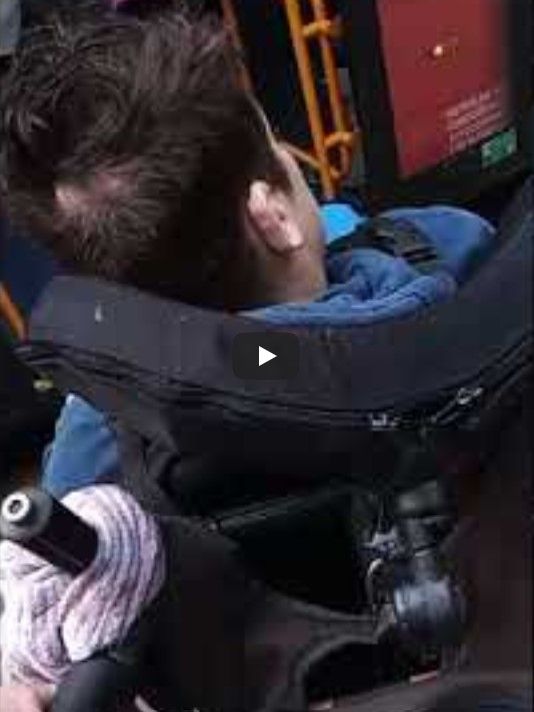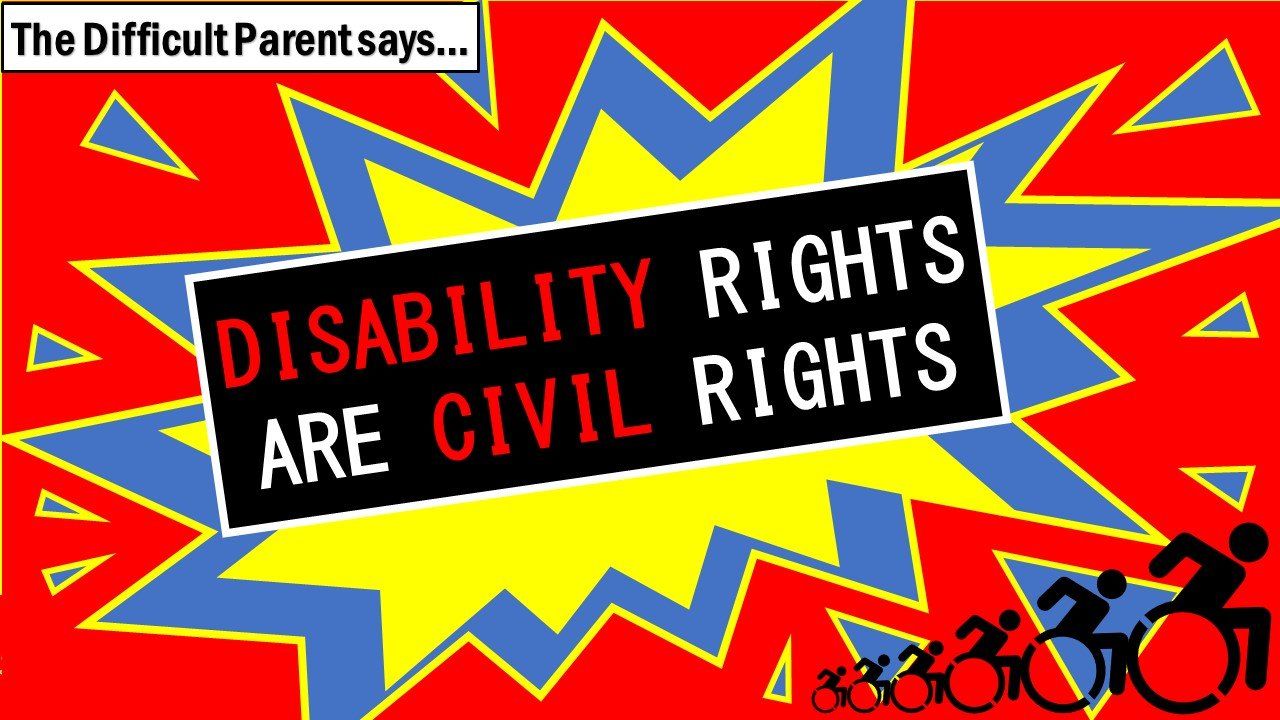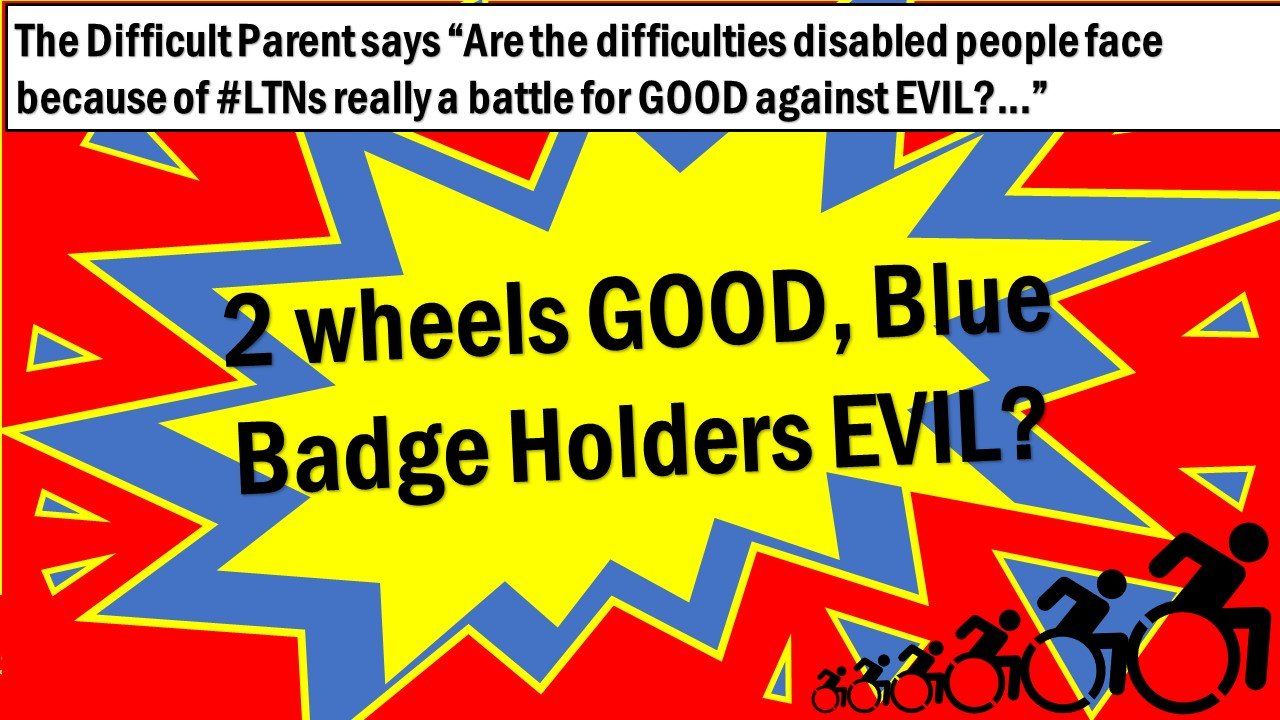Why You said / We did is not 'codesign'
- By The Difficult Parent
- •
- 16 Mar, 2019
- •
'Codesign' is jargon for professionals and all stakeholders working together at all stages of the design process to produce the services that people want and need - it is not about reactive crisis management of a system in failure

You said / we did is by definition not codesign. Service users take a passive not and active role in the process: parents and carers are encouraged to point out issues to the local authority and the local authority respond. Here in Haringey the Moving On / Transitions Reference Group is an example where parents participated from the outset in the codesign of services and the 'Transport Application Form' being an example that more closely followed the 'You said / we did' model.
2.1 Co-design involves a commitment to ensuring that service clients and carers (experts by experience) are involved at the beginning of a process, working with professionals on an equal footing with the same value being given to everyone’s contribution.
From the beginning of the Transitions to Adulthood project parents from a broad church were encouraged to participate, those from within the 'parent groups' and those outside. The larger group was from those outside parent groups and those of us who could not attend but expressed an interest were sent minutes and agenda and engaged in a dialogue with the transformation project manager. Parents and carers did not participate from the outset in the design of the Transport Application form. The new form was imposed upon parents without warning in 2018. As a result there were many issues with the form and it was all but unworkable. A crisis developed and the Markfield Project stepped in running sessions to help parents fill in the forms. Parents were anxious and concerned that they would not get transport in the year ahead.
This happened in the same academic year that the way Home to School Transport was delivered had changed in September 2017. The change in the Home to School Transport service was rife with issues and as a result a survey was written by parents that closely referenced the DfE Guidance to see how well Haringey were meeting their statutory obligations. This was a very fair and balanced survey. There was no reference in the survey to the 'Application Form' as this does not form part of the Guidance, nor was the 'Application Form' written at the time the survey was written. A report on the results of the survey was written, but not by parents. Parents were not given the opportunity to comment on the survey results. The report was quite damning and did not closely reflect the guidance.
2.3 Project plans will need to include specific time for the co-design process and it has to be acknowledged that this will extend project timescales. The benefit of a slightly longer timescale is the value added by including experts by experience in the design process as outlined above and should be included as a mandatory requirement in both the outline and detailed business cases.
It was clear from the outset of the Transitions to Adulthood project what the deliverables were, as well as the timescale, how parents would be involved and as the project progressed a legacy has evolved in the form of the Transitions Reference Group. The meeting's at Markfield regarding the Transport Application form were to manage a crisis situation. Markfield were helping parents to fill in the form. Looking back at emails written to the local authority at the time, the issues were: the form kept crashing and parents were required to upload their child's EHCP plan.
3.1 It is an important principle that experts by experience are confident that they will be listened too and that their contribution can make a difference. Co-design is when an individual and/or groups of people get together to influence the way that services are designed, commissioned and delivered. The test of the process is to ask all those involved in the process, lay members and professionals, if they thought that their contribution made a positive difference to the outcome
The Transformation Manager for the Moving On group was a delight to work for, meet, speak to on the phone, speak to via email. The manager evolved practice as time moved on - shared information for websites; delegated parents to design and analyse surveys and was open to suggestions. A trusting and reciprocal relationship has developed between the Transformation manager, all the parents and all the parents groups. We have been happy to take suggestions from the manager regarding communication, events and engagement, invariably following the advice given. In contrast, when we were contacted via email following an email expressing concern to Transport, we were blamed for adding too much information to the form, however there was no guidance about what information was required. The legacy from that work 'with parents' it the Application Form is still causing problems and it is anticipated that the form will change again for 2020. We can only hope that parents will finally be involved in this design. There was also meeting's on 27th July 2018 regarding post-16 transport. Only one of the parents groups were invited to participate and the invitation to the meeting was sent out by that group at midnight the night before the meeting. Only the steering group of Haringey Involve met with the heads of services regarding the results of the survey and the issues with the application - and other parents views were not included.
I have read a lot about codesign today and I have put some references in below for anyone to wants to follow my journey of discovery.
2.1 Co-design involves a commitment to ensuring that service clients and carers (experts by experience) are involved at the beginning of a process, working with professionals on an equal footing with the same value being given to everyone’s contribution.
From the beginning of the Transitions to Adulthood project parents from a broad church were encouraged to participate, those from within the 'parent groups' and those outside. The larger group was from those outside parent groups and those of us who could not attend but expressed an interest were sent minutes and agenda and engaged in a dialogue with the transformation project manager. Parents and carers did not participate from the outset in the design of the Transport Application form. The new form was imposed upon parents without warning in 2018. As a result there were many issues with the form and it was all but unworkable. A crisis developed and the Markfield Project stepped in running sessions to help parents fill in the forms. Parents were anxious and concerned that they would not get transport in the year ahead.
This happened in the same academic year that the way Home to School Transport was delivered had changed in September 2017. The change in the Home to School Transport service was rife with issues and as a result a survey was written by parents that closely referenced the DfE Guidance to see how well Haringey were meeting their statutory obligations. This was a very fair and balanced survey. There was no reference in the survey to the 'Application Form' as this does not form part of the Guidance, nor was the 'Application Form' written at the time the survey was written. A report on the results of the survey was written, but not by parents. Parents were not given the opportunity to comment on the survey results. The report was quite damning and did not closely reflect the guidance.
2.3 Project plans will need to include specific time for the co-design process and it has to be acknowledged that this will extend project timescales. The benefit of a slightly longer timescale is the value added by including experts by experience in the design process as outlined above and should be included as a mandatory requirement in both the outline and detailed business cases.
It was clear from the outset of the Transitions to Adulthood project what the deliverables were, as well as the timescale, how parents would be involved and as the project progressed a legacy has evolved in the form of the Transitions Reference Group. The meeting's at Markfield regarding the Transport Application form were to manage a crisis situation. Markfield were helping parents to fill in the form. Looking back at emails written to the local authority at the time, the issues were: the form kept crashing and parents were required to upload their child's EHCP plan.
3.1 It is an important principle that experts by experience are confident that they will be listened too and that their contribution can make a difference. Co-design is when an individual and/or groups of people get together to influence the way that services are designed, commissioned and delivered. The test of the process is to ask all those involved in the process, lay members and professionals, if they thought that their contribution made a positive difference to the outcome
The Transformation Manager for the Moving On group was a delight to work for, meet, speak to on the phone, speak to via email. The manager evolved practice as time moved on - shared information for websites; delegated parents to design and analyse surveys and was open to suggestions. A trusting and reciprocal relationship has developed between the Transformation manager, all the parents and all the parents groups. We have been happy to take suggestions from the manager regarding communication, events and engagement, invariably following the advice given. In contrast, when we were contacted via email following an email expressing concern to Transport, we were blamed for adding too much information to the form, however there was no guidance about what information was required. The legacy from that work 'with parents' it the Application Form is still causing problems and it is anticipated that the form will change again for 2020. We can only hope that parents will finally be involved in this design. There was also meeting's on 27th July 2018 regarding post-16 transport. Only one of the parents groups were invited to participate and the invitation to the meeting was sent out by that group at midnight the night before the meeting. Only the steering group of Haringey Involve met with the heads of services regarding the results of the survey and the issues with the application - and other parents views were not included.
I have read a lot about codesign today and I have put some references in below for anyone to wants to follow my journey of discovery.
References and further reading
Haringey's Principles of codesign
The purpose of this Paper is to clarify the term “co-design” and set out a number of core principles and values that are necessary if a process is to be described as “co-designed” or “co-produced”. This Paper has been drafted by the Adult Social Care Planning and Oversight Group to establish standards and criteria which they will apply to their oversight of the co-design process relating to the provision of social care and related health services, including the design and use of buildings for social care, in Haringey.
https://www.minutes.haringey.gov.uk/documents/s93532/Appendix%202%20Co_design_Principles_.pdf
The purpose of this Paper is to clarify the term “co-design” and set out a number of core principles and values that are necessary if a process is to be described as “co-designed” or “co-produced”. This Paper has been drafted by the Adult Social Care Planning and Oversight Group to establish standards and criteria which they will apply to their oversight of the co-design process relating to the provision of social care and related health services, including the design and use of buildings for social care, in Haringey.
https://www.minutes.haringey.gov.uk/documents/s93532/Appendix%202%20Co_design_Principles_.pdf
Mind.org.uk
When a co-design method is used decision making is shared equally throughout the process, everyone taking part has an equal level of power within the process. The method consists of people with the relevant skills and experience coming together to create a tangible ‘product’*. Examples of this include training materials, information booklets, a new service, organisational polices and service specifications.
https://www.mind.org.uk/workplace/influence-and-participation-toolkit/how/methods/co-design/
When a co-design method is used decision making is shared equally throughout the process, everyone taking part has an equal level of power within the process. The method consists of people with the relevant skills and experience coming together to create a tangible ‘product’*. Examples of this include training materials, information booklets, a new service, organisational polices and service specifications.
https://www.mind.org.uk/workplace/influence-and-participation-toolkit/how/methods/co-design/
Codesign: A Best Practice Report
This report is based on the research done within the Erasmus+ Key Action 2 Cooperation for innovation and the exchange of the good practice project CO.CREATE. This report represents an overview of co-design best practice from Austria, Denmark, Slovenia, Slovakia and Spain in Creative Industries.
http://www.cocreate.training/wp-content/uploads/2017/07/co-design_best-practice-report.pdf
This report is based on the research done within the Erasmus+ Key Action 2 Cooperation for innovation and the exchange of the good practice project CO.CREATE. This report represents an overview of co-design best practice from Austria, Denmark, Slovenia, Slovakia and Spain in Creative Industries.
http://www.cocreate.training/wp-content/uploads/2017/07/co-design_best-practice-report.pdf
Case Studies from Whittington Health
Whittington Hospital Pharmacy
The Whittington Hospital is one of the UK’s busiest hospitals employing 4,000 staff who provide care for more than 500,000 people across North London.
Chief Pharmacist at the Whittington Hospital, Dr Helen Taylor, knew that collecting a prescription at the hospital was not a pleasant experience for her patients. They entered the pharmacy often feeling unwell and anxious – and these feelings were exacerbated by long waiting times and lack of communication.
Previous efforts to improve the situation, such as user questionnaires, had resulted in poor levels of patient participation and provided no clear insights.
http://www.designforeurope.eu/case-study/whittington-hospital-pharmacy
The Whittington Hospital is one of the UK’s busiest hospitals employing 4,000 staff who provide care for more than 500,000 people across North London.
Chief Pharmacist at the Whittington Hospital, Dr Helen Taylor, knew that collecting a prescription at the hospital was not a pleasant experience for her patients. They entered the pharmacy often feeling unwell and anxious – and these feelings were exacerbated by long waiting times and lack of communication.
Previous efforts to improve the situation, such as user questionnaires, had resulted in poor levels of patient participation and provided no clear insights.
http://www.designforeurope.eu/case-study/whittington-hospital-pharmacy
Whittington Health’s Ambulatory Care Centre
This innovative new space has been built within the walls of the Victorian hospital, and allows more patients to receive seamless, same-day acute treatment. After working with the Design Council to improve the outpatients’ pharmacy department, the hospital recommissioned Studio TILT to adopt the same codesign approach for its Ambulatory Care Centre
https://www.designcouncil.org.uk/news-opinion/innovative-codesign-project-reinvents-hospital-waiting...
This innovative new space has been built within the walls of the Victorian hospital, and allows more patients to receive seamless, same-day acute treatment. After working with the Design Council to improve the outpatients’ pharmacy department, the hospital recommissioned Studio TILT to adopt the same codesign approach for its Ambulatory Care Centre
https://www.designcouncil.org.uk/news-opinion/innovative-codesign-project-reinvents-hospital-waiting...
Home to School Transport
Statutory Guidance
https://www.gov.uk/government/publications/home-to-school-travel-and-transport-guidance
Statutory Guidance
https://www.gov.uk/government/publications/home-to-school-travel-and-transport-guidance

Haringey SEND Transport are insisting that a 17 year old minibus with no air conditioning is a suitable vehicle to transport my paraplegic son in this heatwave. The appalling conditions inside the minibus inside the bus is something they knew about last summer, yet they have to date done nothing whatsoever provide a suitable minibus this year nor appropriately mitigate the temperatures inside the minibus.The conditions inside the minibus are so bad that they triggered multiple seizures during the heatwave as my son has epilepsy, which they SEND transport department know about and they also know that they are triggered by heat.It is not just son who is impacted: last year we know of one child who died on Haringey SEND Transport in the summer heatwave and another who had seizures.









